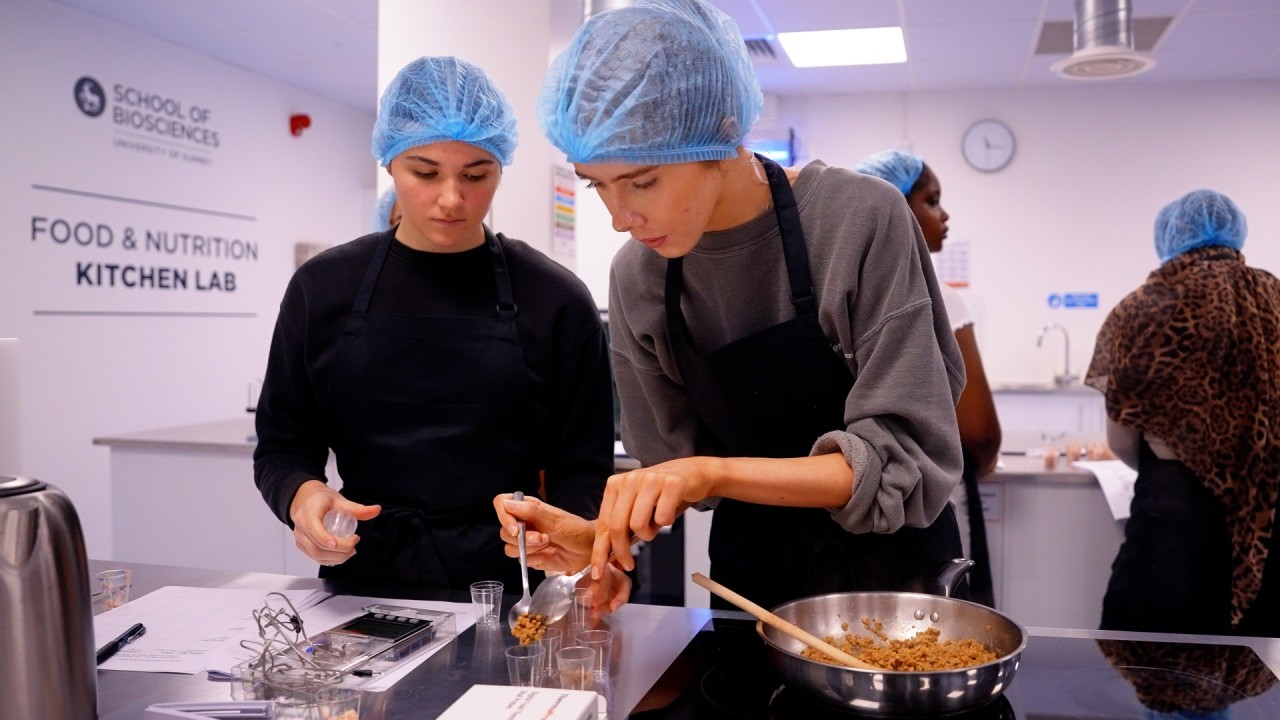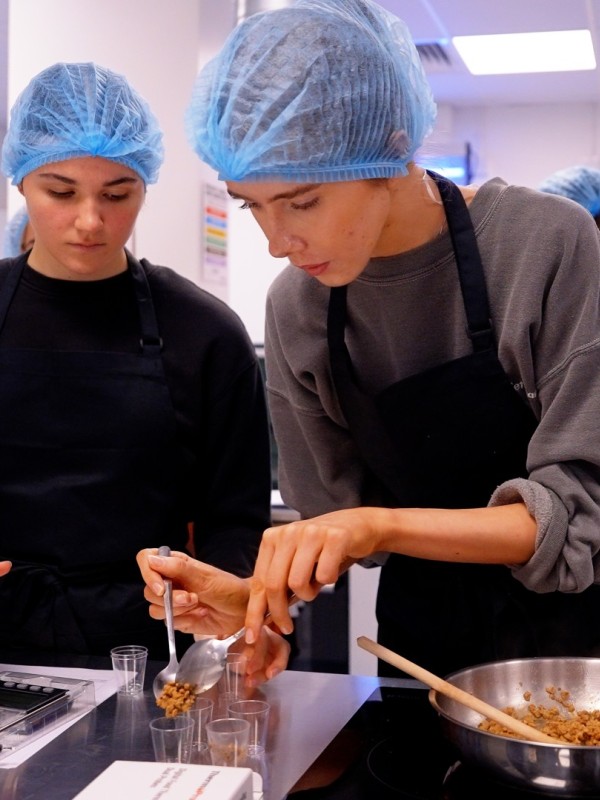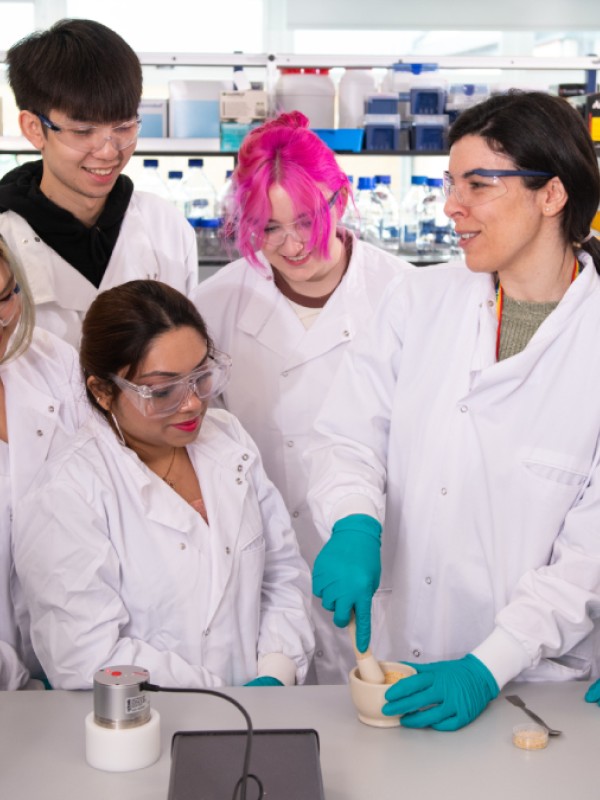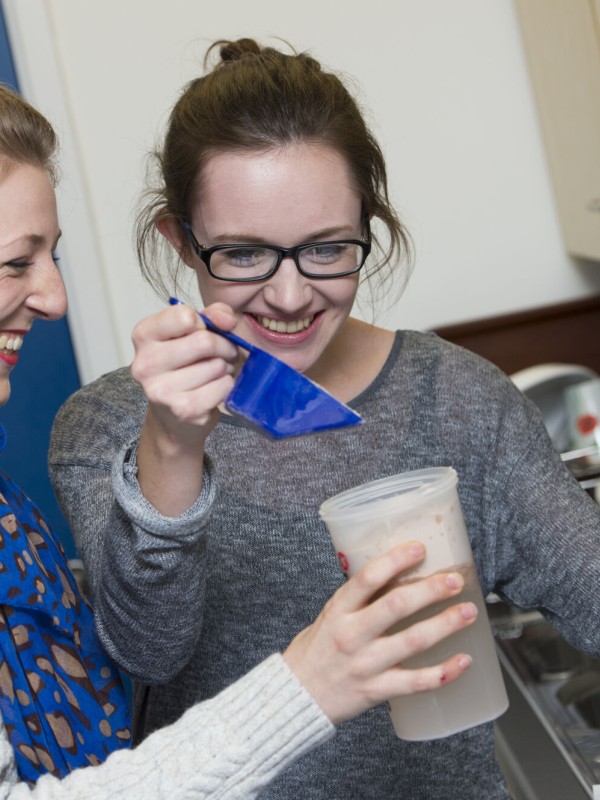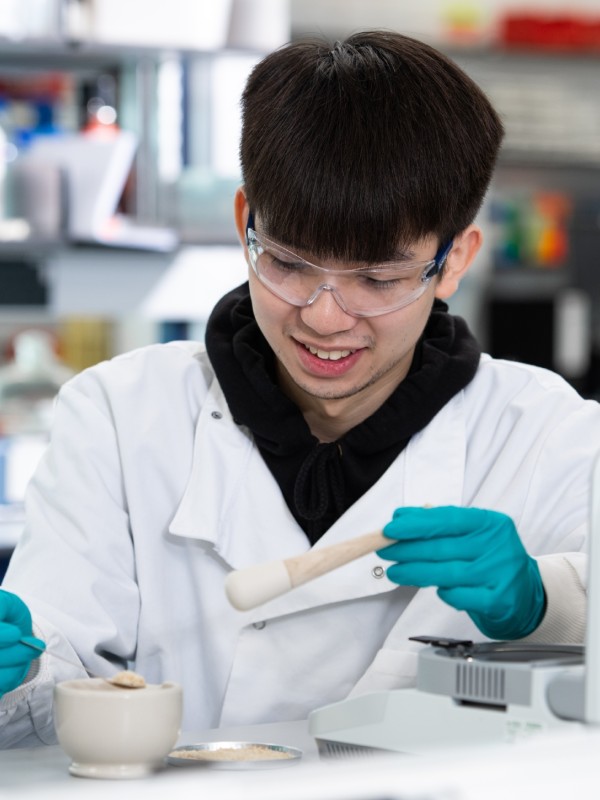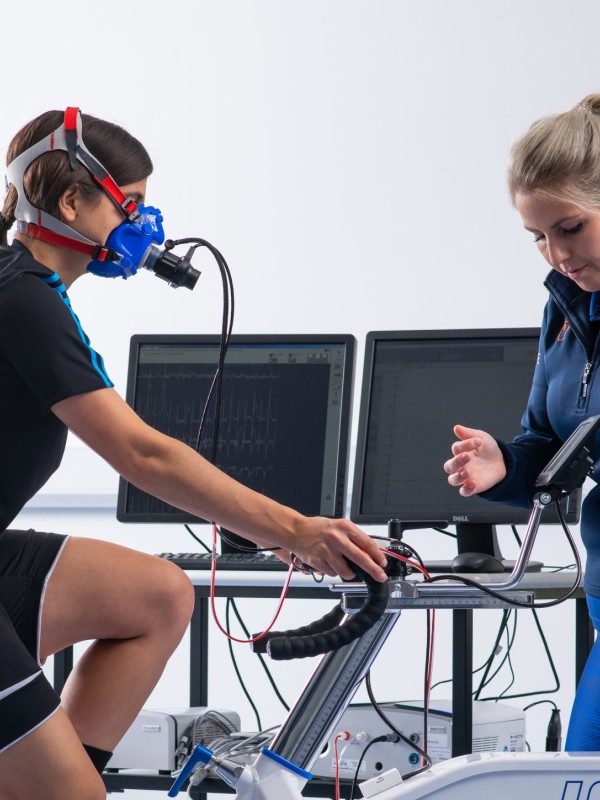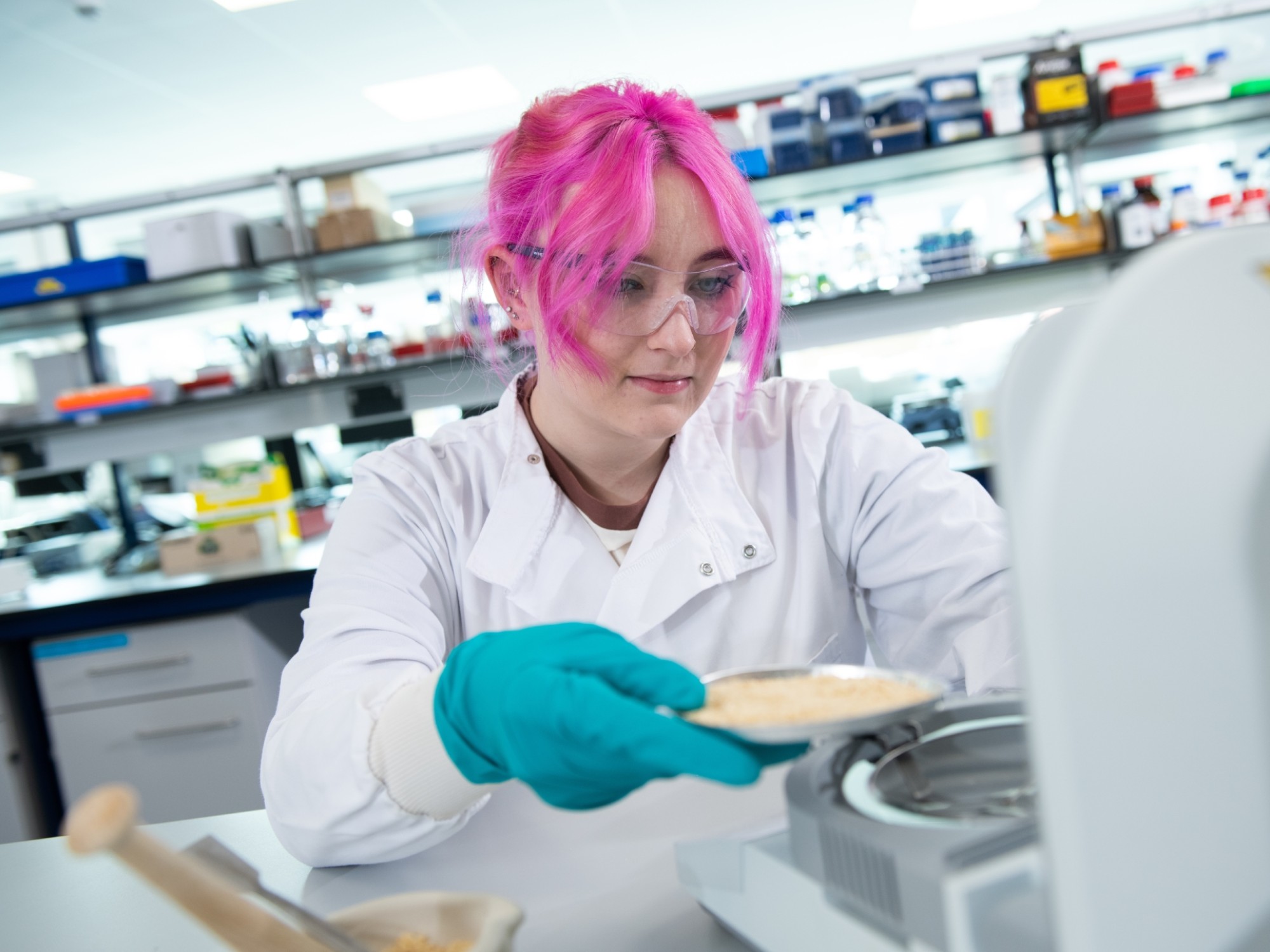
- Nutrition
BSc (Hons) — 2027 entry Nutrition
On our BSc Nutrition you'll learn about the science behind nutrition, focusing on the nutrients found in food, how the body uses them and how they relate to health and disease.
4,161+ people have created a bespoke digital prospectus
Why choose
this course?
- Access our £12.5 million Innovation for Health Learning Laboratory to conduct experiments, and our Food and Nutrition Kitchen Lab to develop skills in food preparation, meal development, food hygiene and more.
- Gain industry experience through a Professional Training placement, working for an employer such as the Government, an NHS trust or a nutrition company.
- Learn from lecturers who have been awarded a Queen Elizabeth Prize (formerly Queen’s Anniversary Prize) for Further and Higher Education, in recognition of their research excellence in the field of food and nutrition.
- Take the opportunity to participate in the prestigious Ecotrophelia competition by developing an eco-innovative food product and contribute to Surrey’s legacy of highly successful teams, including the UK winner and European finalist in 2024.
- Get the academic requirements needed to register with the Association for Nutrition (AfN) to work as an associate nutritionist once you’ve graduated.
Statistics
1st in the UK
For food science in the Complete University Guide 2026
2nd in the UK
For food science in The Times and The Sunday Times Good University Guide 2026
2nd in the UK
For overall student satisfaction* in nutrition and dietetics in the National Student Survey 2025
*Measured by % positivity based on Q1-24 for all providers listed in the Guardian University Guide league tables.
Accreditation
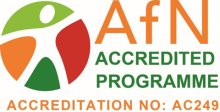
What you will study
On our BSc Nutrition course, you’ll gain an in-depth understanding of how the body assimilates and uses nutrients, and you’ll fully appreciate how human nutrition impacts health and the development of disease.
In your first year, you’ll study topics including biochemistry, cell biology, food science, human nutrition and health, and physiology, ensuring you have a solid foundation upon which to build the rest of your degree. We’ll also encourage you to start thinking about contemporary issues in nutrition, as you begin to develop your skills.
In your second year, you’ll get the option to undertake food analysis and quality control, to improve the nutritional profile, eating quality and safety of food products, or investigate the fundamental aspects of new product design and development, studying the functionality of the main ingredient components of food and their impact on nutritional aspects.
In your third year, you’ll have the choice to specialise further in an area of personal interest, which could be:
- Analysing foods and processing methods that meet UK and EU food legislation and guidelines
- Studying the biochemical transformations which occur during the processing, storage and preparation of foods
- Exploring the role heat processes have on the destruction of microorganisms.
You’ll also complete a research project, bringing together all the practical, analytical, and presentation skills you’ve developed.
Professional recognition
BSc (Hons) - Association for Nutrition (AfN)
Accredited by the Association for Nutrition (AfN) for the purpose of eligibility for Direct Entry Registration at Associate Level with the UK Voluntary Register of Nutritionists (UKVRN).
Research-led curriculum
We have a research-led focus to our teaching, ensuring everything you learn is up-to-date and relevant to commercial, public health and research-orientated careers. We were awarded the Queen Elizabeth Prize (formerly Queen's Anniversary Prize) 2017-18 for Further and Higher Education, in recognition of our research excellence in the field of food and nutrition. To date, the University of Surrey is the only institution to have been awarded the prize in this category.
Ecotrophelia
Surrey has a well-established history of entering successful student teams into the Ecotrophelia competition. Our teams have been shortlisted for the past five years and won the UK competition in 2024, going on to represent the UK in the European finals. Surrey teams’ products include Pea-zza, Earthly Blends, BoozyBalls (UK winner) and Favafu.
The competition encourages eco-innovation in the food sector and connects emerging talent with industry leaders. To enter the competition, you must develop an innovative, environmentally sustainable food and beverage product that is technically feasible and commercially viable. You can get experience of creating your own food product if you opt for the second-year module ‘New Product Development’.
Foundation year
If you don’t meet our entry requirements, you might still be able to apply for this degree with a Biosciences Foundation Year. This is an extra year of study to develop your skills and make it easier for you to get started at university. On successful completion of your foundation year, you’ll be ready to progress to the first year of your degree.
To see what modules you’ll be studying, refer to the foundation tab in the 'course structure' section.
The academic year is divided into two semesters of 15 weeks each. Each semester consists of a period of teaching, revision/directed learning and assessment.
The structure of our programmes follow clear educational aims that are tailored to each programme. These are all outlined in the programme specifications which include further details such as the learning outcomes.
- Nutrition BSc (Hons)
- Nutrition BSc (Hons) with placement
- Nutrition BSc (Hons) with foundation year
- Nutrition BSc (Hons) with foundation year and placement
Please note: The full module listing for the optional Professional Training placement part of your course is available in the relevant programme specification.
Modules
Modules listed are indicative, reflecting the information available at the time of publication. Modules are subject to teaching availability, student demand and/or class size caps.
The University operates a credit framework for all taught programmes based on a 15-credit tariff.
Course options
Year 1 - BSc (Hons)
Semester 1
Compulsory
The module introduces some essential nutrition and health concepts and their practical application. Students will learn those concepts at an introductory level through pre-recorded content, live lectures, online sessions and panel discussions, which will be further developed in subsequent modules throughout level 4 to level 6. The module also focuses on developing students' professional skills, such as teamwork and communication skills, through interactive practical sessions and team-based activities.
View full module detailsThis module supports all students in starting their journey toward becoming an informed and effective professional, in the ever-evolving landscape of modern food, health and exercise science. Students will explore subject-specific content in their respective course cohorts. This includes contemporary topics, focusing on persistent misconceptions, current issues, and essential skills for success in their field. This will inform an exciting assessment format, whereby students will work in groups to develop a promotional video for a food, health, or exercise product, using contemporary scientific research and information technology. Students will also explore core content as one larger cohort. This includes essential knowledge required to succeed in both their studies and their professional field of practice. This will require all students to draw upon their own core knowledge, their interpersonal and intrapersonal skills, and their strengths and weaknesses, in order to take full advantage of the personal and professional development opportunities available. This will be realised in the written coursework assessment, where students must analyse and reflect on a peer’s work, their own development, and their future developmental needs. Completion of this module will support the student transition to subsequent modules and levels of study, particularly where they are required to interpret scientific research, problem solve, work with others and use information technology.
View full module detailsThis module is designed to develop a fundamental understanding of the structure and function of cells and the biochemical processes that underpin them.
View full module detailsSemester 2
Compulsory
In this module students will be taken on a learning journey through protein structure and function, emphasising their importance in the biochemical processes which occur within living cells. Students will explore the contributions of lipid molecules and sugars to cellular ATP production, and will be introduced to the important role that the TCA cycle and electron transport systems have in production of ATP. Students will undertake practical classes which highlight and develop the concepts taught within the module, and which will enhance their understanding of the key concepts.
View full module detailsThis module builds on from knowledge gained in semester one in cell biology and biochemistry and starts placing the knowledge gained there into a greater perspective relevant to all fields related to Sport & Exercise and Nutritional Sciences. Physiology aims to understand the underlying mechanisms of living things from a basic cellular level all the way up to a whole organism and how the different structures (e.g. organs) interact and influence each other. In this module we will start to instil an appreciation and initial endeavour to integrating molecular, cellular, and whole-body functions. Physiology helps to create an understanding of how our bodies stay healthy and deal with and overcome pressures in everyday life such as stress or disease and how we can improve our health, performance and longevity.
View full module detailsThis module aims to lay groundwork in practical skills for the nutrition professionals of the future. This centers around understanding food properties, production and nutritional qualities. This module builds on information learnt in BMS1055 and the skills from this module will support professional development in second and final year modules, as well as professional placement year for those undertaking this.
View full module detailsSemester 1 & 2
Compulsory
The purpose of this year-long module is to provide an understanding of the major food components (water, fats, carbohydrates, proteins and alcohol) and some important minor food components, in terms of their nature and role in foods. It provides insight into the nutritional principles of fats, carbohydrates and proteins and how dietary macronutrient requirement values are derived. The module is also designed to introduce students to the practical features relating to food science (including Microbiology) and nutrition. It provides students with an understanding of the key properties of macronutrients, how they can be analyzed and how their physical and chemical properties can influence the properties of foods which relate to how they operate in industry and in the domestic setting. The module also introduces students to the major groups of microorganisms in the environment & in foods and their relationship to health. It examines the micro-flora of foods and how these can be evaluated using standard laboratory techniques relevant to the food industry. Several practical classes are used to illustrate the features being studied in the module. The module is a pre-requisite for BMS2042 Food Science: Perception, Processing and Preservation, which is undertaken by students in Food Science & Nutrition, Nutrition and Nutrition & Dietetics. The module prepares students for BMS 2042 Food Science and also, where applicable, BMS2041 Food Microbiology. This year long module is relevant to all Nutritional Sciences programs.
View full module detailsYear 2 - BSc (Hons)
Semester 1
Compulsory
The purpose of this module is to provide an in-depth introduction to the fundamentals of human nutrition for all students on nutrition-based degree programmes, building on knowledge of food science, biochemistry and principles of nutrition and health acquired in level 4. Students will develop their understanding of the biochemical characteristics of nutrients in the human diet, with particular focus on macronutrients and nutritionally important micronutrients. The knowledge acquired will fundamentally underpin their learning in a number of other modules in both level 5 (BMS2077, BMS2050 and BMS2052) and level 6 (BMS3069, BMS3107 and BMS3111). Students will also be encouraged to practically apply this knowledge by critically assessing the nutritional adequacy of specific diets encountered in the general population for health and disease prevention. As such, it has specific utility for students seeking placements and employment opportunities in a broad range of nutrition-focused environments and those working with population groups.
View full module detailsThis module is very rich in food science content and builds upon the basic food science concepts introduced in BMS1064. This module will also set the basis for the module BMS2078 (Sem 2) as well as covering topics that will further expanded in BMS3070 (processes) and BMS3059 (Maillard Reaction). BMS2042 is designed to give our students an in depth understanding of key aspects of food science and is complimentary to what is thought in BMS2041.This module is of extreme importance for nutrition and nutrition and dietetics student who will get the only change to appreciate how Food Science, Nutrition and Dietetics are interrelated and essential to one another. The module will introduce students to the main reactions happening in foods (browning, chemical reactions, enzymatic reactions) alongside the main ingredients used as additives in complex food formulation s. The attention is then shifted to an introduction to processes (which will be further covered in-depth in BMS3070 with a focus on novel processes/minimally processed foods) as well as covering aspects related to preservation and perception of foods. As mentioned above, this module is not only essential for Food Science and Nutrition students, but is also important component of the Nutrition and Dietetics programs, as it links these to the study of food and its chemistry.
View full module detailsThis module is designed to accompany parallel modules on nutrition. It demonstrates the context by which human physiology and metabolism impact nutrition and nutritional status. The module outlines the role of the specific metabolic organs (liver, adipose tissue, skeletal muscle) and the integration of metabolism, including endocrinology. The module also covers the role of micronutrients, particularly in relation to 1C metabolism.
View full module detailsThis module continues the development of nutrition, professional and communication skills started in BMS1034 and BMS1055. These skills are particularly focused towards the application of nutrition principles while having a deeper understanding of the individuals and communities that we work with. Students are taught together for the first half of the module, and then split into course specific content for the Nutrition and Nutrition & Dietetics programmes towards the end of the semester.
View full module detailsSemester 2
Compulsory
This module builds on the subject knowledge students have gained with respect to individual nutrients and disease conditions and supports students to apply this in a practical way to the dietary needs of various population groups, equipping them for their future careers across the food, nutrition & dietetic space. The module takes a life course approach moving from pre-conception and pregnancy through to middle and older age, discussing the key nutrients needs at each stage and the key health conditions affecting each group and how they can be reduced or managed via diet and nutrition. In all cases students are encouraged to consider the range of factors affecting diet and lifestyle choices and health outcomes to allow them to provide practical and population-centred recommendations which develop their global and cultural capabilities. Through this module students are also supported to build on the transferable skills developed at level 4 (for example referencing and critical appraisal) and both assignments provide opportunities to apply, and receive feedback on, these skills as well as to apply their subject knowledge.
View full module detailsThe purpose of this module is to provide an understanding of the pathological basis of disease, with a particular focus on abnormal metabolic states. It extends the student’s existing knowledge of human physiology gained at levels 4 (BMS1032) and 5 (BMS2077 and BMS2063) into pathological conditions, with focus on underlying causes, signs and symptoms, diagnosis and practical management and treatment of disease. Using the biomedical disciplines of clinical biochemistry, haematology, immunology and pharmacology, this module aims to build a knowledge and understanding of disease which students can apply to practical case studies and clinical scenarios, to aid development of a differential diagnosis. As such, it has specific utility for students working in a clinical environment and with population groups who may have underlying pathologies, in order to improve nutritional, clinical and pharmacological management of these individuals. The focus on practical application of knowledge throughout this module also instills critical thinking, resourcefulness and clinical reasoning skills in students, which are highly desirable for future employment.
View full module detailsIn this module, you will gain essential foundational knowledge and skills required to proficiently plan and conduct research studies. The module focuses on key research skills, including research design, qualitative and quantitative data analysis, and critical review, preparing you for advanced exploration in BMS3057 during level 6, where research design strategies and data analytical procedures are further emphasised. Moreover, this module provides a solid foundation to equip you with the necessary skills and knowledge to undertake your Dissertation module in level 6. By exploring a range of research approaches utilised in the exploration of various phenomena, whether in nutrition or sport and exercise science, you will understand the significance of systematic and rigorous research design as the cornerstone of scientific inquiry, investigation, examination, and exploration. Through practical application and theoretical understanding, you will develop the capabilities to understand, interpret, conceptualise, and apply diverse research methodologies and methods, empowering you to design and execute scientific investigations effectively within your respective disciplines.
View full module detailsOptional
This module covers a selection of analytical techniques used to ensure food is safe, conforms to quality specifications and that its nutritional content is accurately described. Laboratory practicals allow students to apply some of the theoretical knowledge gained in lectures and tutorials to real food products. Students will develop their written communication skills within a scientific discipline, enabling them to explain theoretical knowledge and perform data analysis. The lectures, practicals and tutorials form essential components of the degree in Food Science and Nutrition (BD46). Students studying Nutrition (B400) and Microbiology (C500) also benefit.
View full module detailsThis module, strongly linked to BMS1064 in L4 and BMS2042 in L5, will cover the fundamental aspects needed for new product design and development. Students will start learning about the functionality of the main ingredient components in foods (fats, carbohydrates and proteins) and their impact on nutritional aspects as well.Following this, the module will cover further steps involved in the design of novel products such as marketing evaluation of target consumers, product development, sensory and physical evaluations, shelf-life and packaging, followed by food law legislation key aspects such as labelling. The module covers complementary content to BMS2053, in fact, the sugar and fat reduction practicals are often a good complementation for BMS2053's practicals on sugars and fats. The module will aim to the development of specific solving skills and will include visits to food industries as a mean for the students to have a hands-on evaluation of the realistic industrial based environment.
View full module detailsThis module focuses on clinical dietetics, such as nutrition support for patients with different clinical conditions and managing patients with chronic conditions. Alongside the teaching of new knowledge, this module continues to draw on and build on knowledge from previous modules (e.g. BMS1055, BMS1034, BMS2040, BMS2039 etc.) with a focus on their application in clinical scenarios. The strong focus on application in clinical practice of this module will equip the students well for their clinical placements B and C. Please note that this module has mandatory attendance requirement due to professional body requirement
View full module detailsOptional modules for Year 2 - FHEQ Level 5
Choose 1 from 2.
BMS2049 Applied Dietetics is only open to students who have successfully completed an interview and A placement and are enrolled on the Nutrition & Dietetic programme at the start of level 5
Year 3 - BSc (Hons)
Semester 1
Compulsory
This module focuses on the role of energy balance and lipid metabolism in cardio-metabolic disease. Students are taught current evidence-based understanding on the interplay of diet, physical activity and lifestyle in the development prevention and management of metabolic disease. The module is split into two halves, each half culminating in an applied online examination/test. Part 1 The module is a continuation of previous modules in their second year but with a clear focus on current and emerging evidence in the field of appetite and energy balance regulation. This introduces students to some current theories and mechanistic work that is beginning to influence clinical appreciation, particular in relation to body weight regulation (obesity and undernutrition). Students are reminded of how adiposity and lipid metabolism is integral to our understanding of what influences cardiometabolic risk (e,g, cardiovascular disease, insulin resistance) Part 2 Having established a current understanding of the mechanistic basis, the second part explores new and emerging evidence how the interplay between adiposity and risk is influenced and can itself be manipulated/ Similarly how dietary and lifestyle factors influence and mitigate against cardiometabolic risk. The module also critically appraises current dietary approaches to weight management and metabolic health and explores issues of maintaining a “healthy” weight
View full module detailsThis Module provides a broadly-based review of current methods employed in experimental nutrition, food science and sport & exercise sciences, with hands-on practical aspects in statistics, epidemiology, study design, physical activity assessment and dietary intake measurements, as well as experience in scientific writing and critical reviews. Statistics will be at the level of simple (e.g. descriptives and correlations) and more complex (t-test, Mann Whitney U test, Wilcoxon Matched Pairs, ANOVA, Friedman Test, Repeated Measures ANOVA and Regression). Statistics will be assessed through a piece of coursework analyzing data from either a Nutrition & Health dataset or an Exercise & Health Dataset from original published papers. The Module will also provide an opportunity to develop professional skills, attributes and awareness of appropriate conduct/practice crucial to working in the sectors of Food, Nutrition, Dietetics or Sport. This module will also help with preparation for employability, including presentations and discussions on career options. Both professional skills and employability will be assessed through a piece of coursework on Case Studies and a digital LinkedIn page. Each Coursework will be worth 50% of the marks.
View full module detailsOptional
This module covers a variety of important components in foods that arise from the chemical and biochemical transformations which occur during the processing, storage and preparation of foods. It builds on previous knowledge in food science, particularly BMS2042 (Food Science: Perception, Processing and Preservation), in terms of enhancing the understanding of the complex reactions that occur in foods. This will be done by critically examining the published research in the field, which will be helpful for the final year research project. The emphasis is focused on understanding how the compounds are formed, the levels present and their role in food safety, acceptability and health effects.
View full module detailsThis module focuses on the application of nutrition to sports and exercise. Building on core nutritional knowledge developed from BMS2039 or BMS2071, Sport & Exercise Nutrition will provide further applied information specific for athletes or active individuals. The module begins with an introduction to exercise physiology to enable all to be able to frame activity with specific energy systems, aiding nutritional understanding and links to substrate and fuel needs. The module will discuss key nutrients required for sports nutrition and develop links to specific sporting endeavors. Content is taught using a collection of in house and external speakers from industry and academia. By the end of the module students will be confident in how to apply nutrition principles in a sport and exercise setting.
View full module detailsSemester 2
Compulsory
The purpose of this module is to develop the student’s knowledge of Public Health Nutrition. The module will introduce them to the topic of public health nutrition and the issues surrounding food and nutrition for the UK population’s nutritional health plus a wider view of global food security and nutritional health
View full module detailsOptional
The Biological Rhythms module is designed to provide students with a comprehensive, research-led overview of current topics in Biological Rhythms, with an emphasis on mammalian Chronobiology. The module builds on critical evaluation skills developed in previous modules, including appraisal and interpretation of scientific literature and evaluating current gaps in our knowledge. The module is delivered as a mix of lectures, online content, several tutorials and drop-in sessions in which knowledge is integrated and evaluated. The summative assessments of this module consists of a mid-module in-class test and a final exam, in which students apply skills in interpreting current knowledge, subject-specific concepts and methods gained in the module to develop forward-looking views that apply and validate research insights in real world conditions.
View full module detailsThis module covers a variety of important aspects related to Food Technology and Safety. The first part of the module covers aspects related to Food Safety in particular in relation to chemically based toxic products present in some foods. The second part of the module is focussed on the processes used in food production and preservation (Food Technology), some of these processes are put in place to further preserve foods’ quality as well as having a lower impact on the environment. Students will also have a look into the packaging area thus exploring novel and more sustainable products. In particular, a variety of heat processes are covered in detail highlighting their role in the destruction of spoilage microorganisms. The final part of the module covers the role of refrigeration and freezing in food preservation as well as food packaging, including the safety considerations. This module builds on previous modules concerned with food science in terms of enhancing the understanding of potential toxic products present in foods and their risk assessment. Furthermore, a greater emphasis is placed at this level (6) on understanding the principles and application of different food processes and their global application. Learning is embedded by the use of videos of food processing.
View full module detailsThe purpose of the module is to provide a detailed theoretical knowledge of Food, Water and Soil Security in order to improve the provision of safe food components and commodities that have high nutritional and ecological quality. In this respect, the analysis of foods and farming & processing methods that meet UK and EU Food Legislation and associated guidelines is examined. In addition, this module covers aspects related to Farm Production, Food Fraud and Food Safety, particularly in the area of animal welfare, animal species adulteration and food-borne diseases. Students will also appreciate the importance of carrying out appropriate risk assessment for further implementation of HACCP and control methods in the food industry. The module comprises lectures, tutorials and assessments that form an essential part of the Food Science and Nutrition (BD46) degree. It is also highly recommended to students doing Nutrition, Dietetics or the Veterinary Biosciences degree.
View full module detailsThis module builds on the knowledge of the sound basis of the science of human nutrition you developed during the Nutrition/Dietetics/Food Science/Sports and Exercise Science FHEQ Level 5 courses. This module will provide students with a research-led in-depth critical evaluation of several current hot topics regarding the mechanistic basis of nutrient requirements in health and disease. The module has a particular, but not exclusive, focus on micronutrients and is delivered by academics who are research active in the topics covered. The lecture materials, tutorials and, in particular, the coursework assessment are designed to help develop your skills in data analysis, data interpretation and critical evaluation of current scientific evidence. Emphasis will be placed on integration of knowledge from the different areas presented in the lectures.
View full module detailsThe primary purpose is to consolidate students theoretical and practical knowledge in the dietary management of key clinical specialties and patient groups. They should integrate their practical expertise and knowledge from their Placement with a more in depth understanding of the metabolic basis for the treatment of patients with specific diseases (focusing on those which they will meet in their first post as a dietitian). Understanding the evidence base of their practice is also a key aim. The students will have the ability to critically appraise the literature and understand when it should be used to inform and update current practice. Both assignments provide opportunities to apply, and receive feedback on, these skills as well as to apply their subject knowledge
View full module detailsSemester 1 & 2
Core
The final year research project is the culmination of all the practical, analytical, literature and presentation skills developed during the typical undergraduate degree programme. This module allows the student to engage in an in-depth major project in an area relevant for nutritional science in the 21st Century. Projects may involve direct data collection, analysis of pre-existing datasets or “big-data”, systematic reviews/meta-analysis or involve writing a research grant application to answer a pertinent nutritional question. The project will run over two semesters, and the student is expected to spend a minimum of one full day each week (in terms of hours) working on the project. The student and supervisor(s) will discuss how the work is to be divided into background research, laboratory work/data collection, data analysis and report writing. Students will be expected to liaise regularly with their supervisor(s) and if undertaking a laboratory-based project will be expected to follow good laboratory practice and adhere to local safety rules at all times. Those undertaking a clinical project either based within the University or the NHS will be expected to follow ethical guidelines, store and dispose of material in accordance with the guidelines produced by the Human Tissue Authority and follow the University policy on confidentiality and data protection
View full module detailsOptional modules for Year 3 - FHEQ Level 6
Must choose 3 in total. 1 out of 2 in Semester 1, and 2 out of 4 in Semester 2.
BMS3068 Clinical Nutrition & Dietetics is only open to students who have successfully completed an interview and A placement and are enrolled on the Nutrition & Dietetic programme at the start of level 6
Year 1 - BSc (Hons) with placement
Semester 1
Compulsory
The module introduces some essential nutrition and health concepts and their practical application. Students will learn those concepts at an introductory level through pre-recorded content, live lectures, online sessions and panel discussions, which will be further developed in subsequent modules throughout level 4 to level 6. The module also focuses on developing students' professional skills, such as teamwork and communication skills, through interactive practical sessions and team-based activities.
View full module detailsThis module supports all students in starting their journey toward becoming an informed and effective professional, in the ever-evolving landscape of modern food, health and exercise science. Students will explore subject-specific content in their respective course cohorts. This includes contemporary topics, focusing on persistent misconceptions, current issues, and essential skills for success in their field. This will inform an exciting assessment format, whereby students will work in groups to develop a promotional video for a food, health, or exercise product, using contemporary scientific research and information technology. Students will also explore core content as one larger cohort. This includes essential knowledge required to succeed in both their studies and their professional field of practice. This will require all students to draw upon their own core knowledge, their interpersonal and intrapersonal skills, and their strengths and weaknesses, in order to take full advantage of the personal and professional development opportunities available. This will be realised in the written coursework assessment, where students must analyse and reflect on a peer’s work, their own development, and their future developmental needs. Completion of this module will support the student transition to subsequent modules and levels of study, particularly where they are required to interpret scientific research, problem solve, work with others and use information technology.
View full module detailsThis module is designed to develop a fundamental understanding of the structure and function of cells and the biochemical processes that underpin them.
View full module detailsSemester 2
Compulsory
In this module students will be taken on a learning journey through protein structure and function, emphasising their importance in the biochemical processes which occur within living cells. Students will explore the contributions of lipid molecules and sugars to cellular ATP production, and will be introduced to the important role that the TCA cycle and electron transport systems have in production of ATP. Students will undertake practical classes which highlight and develop the concepts taught within the module, and which will enhance their understanding of the key concepts.
View full module detailsThis module builds on from knowledge gained in semester one in cell biology and biochemistry and starts placing the knowledge gained there into a greater perspective relevant to all fields related to Sport & Exercise and Nutritional Sciences. Physiology aims to understand the underlying mechanisms of living things from a basic cellular level all the way up to a whole organism and how the different structures (e.g. organs) interact and influence each other. In this module we will start to instil an appreciation and initial endeavour to integrating molecular, cellular, and whole-body functions. Physiology helps to create an understanding of how our bodies stay healthy and deal with and overcome pressures in everyday life such as stress or disease and how we can improve our health, performance and longevity.
View full module detailsThis module aims to lay groundwork in practical skills for the nutrition professionals of the future. This centers around understanding food properties, production and nutritional qualities. This module builds on information learnt in BMS1055 and the skills from this module will support professional development in second and final year modules, as well as professional placement year for those undertaking this.
View full module detailsSemester 1 & 2
Compulsory
The purpose of this year-long module is to provide an understanding of the major food components (water, fats, carbohydrates, proteins and alcohol) and some important minor food components, in terms of their nature and role in foods. It provides insight into the nutritional principles of fats, carbohydrates and proteins and how dietary macronutrient requirement values are derived. The module is also designed to introduce students to the practical features relating to food science (including Microbiology) and nutrition. It provides students with an understanding of the key properties of macronutrients, how they can be analyzed and how their physical and chemical properties can influence the properties of foods which relate to how they operate in industry and in the domestic setting. The module also introduces students to the major groups of microorganisms in the environment & in foods and their relationship to health. It examines the micro-flora of foods and how these can be evaluated using standard laboratory techniques relevant to the food industry. Several practical classes are used to illustrate the features being studied in the module. The module is a pre-requisite for BMS2042 Food Science: Perception, Processing and Preservation, which is undertaken by students in Food Science & Nutrition, Nutrition and Nutrition & Dietetics. The module prepares students for BMS 2042 Food Science and also, where applicable, BMS2041 Food Microbiology. This year long module is relevant to all Nutritional Sciences programs.
View full module detailsYear 2 - BSc (Hons) with placement
Semester 1
Compulsory
The purpose of this module is to provide an in-depth introduction to the fundamentals of human nutrition for all students on nutrition-based degree programmes, building on knowledge of food science, biochemistry and principles of nutrition and health acquired in level 4. Students will develop their understanding of the biochemical characteristics of nutrients in the human diet, with particular focus on macronutrients and nutritionally important micronutrients. The knowledge acquired will fundamentally underpin their learning in a number of other modules in both level 5 (BMS2077, BMS2050 and BMS2052) and level 6 (BMS3069, BMS3107 and BMS3111). Students will also be encouraged to practically apply this knowledge by critically assessing the nutritional adequacy of specific diets encountered in the general population for health and disease prevention. As such, it has specific utility for students seeking placements and employment opportunities in a broad range of nutrition-focused environments and those working with population groups.
View full module detailsThis module is very rich in food science content and builds upon the basic food science concepts introduced in BMS1064. This module will also set the basis for the module BMS2078 (Sem 2) as well as covering topics that will further expanded in BMS3070 (processes) and BMS3059 (Maillard Reaction). BMS2042 is designed to give our students an in depth understanding of key aspects of food science and is complimentary to what is thought in BMS2041.This module is of extreme importance for nutrition and nutrition and dietetics student who will get the only change to appreciate how Food Science, Nutrition and Dietetics are interrelated and essential to one another. The module will introduce students to the main reactions happening in foods (browning, chemical reactions, enzymatic reactions) alongside the main ingredients used as additives in complex food formulation s. The attention is then shifted to an introduction to processes (which will be further covered in-depth in BMS3070 with a focus on novel processes/minimally processed foods) as well as covering aspects related to preservation and perception of foods. As mentioned above, this module is not only essential for Food Science and Nutrition students, but is also important component of the Nutrition and Dietetics programs, as it links these to the study of food and its chemistry.
View full module detailsThis module is designed to accompany parallel modules on nutrition. It demonstrates the context by which human physiology and metabolism impact nutrition and nutritional status. The module outlines the role of the specific metabolic organs (liver, adipose tissue, skeletal muscle) and the integration of metabolism, including endocrinology. The module also covers the role of micronutrients, particularly in relation to 1C metabolism.
View full module detailsThis module continues the development of nutrition, professional and communication skills started in BMS1034 and BMS1055. These skills are particularly focused towards the application of nutrition principles while having a deeper understanding of the individuals and communities that we work with. Students are taught together for the first half of the module, and then split into course specific content for the Nutrition and Nutrition & Dietetics programmes towards the end of the semester.
View full module detailsSemester 2
Compulsory
This module builds on the subject knowledge students have gained with respect to individual nutrients and disease conditions and supports students to apply this in a practical way to the dietary needs of various population groups, equipping them for their future careers across the food, nutrition & dietetic space. The module takes a life course approach moving from pre-conception and pregnancy through to middle and older age, discussing the key nutrients needs at each stage and the key health conditions affecting each group and how they can be reduced or managed via diet and nutrition. In all cases students are encouraged to consider the range of factors affecting diet and lifestyle choices and health outcomes to allow them to provide practical and population-centred recommendations which develop their global and cultural capabilities. Through this module students are also supported to build on the transferable skills developed at level 4 (for example referencing and critical appraisal) and both assignments provide opportunities to apply, and receive feedback on, these skills as well as to apply their subject knowledge.
View full module detailsThe purpose of this module is to provide an understanding of the pathological basis of disease, with a particular focus on abnormal metabolic states. It extends the student’s existing knowledge of human physiology gained at levels 4 (BMS1032) and 5 (BMS2077 and BMS2063) into pathological conditions, with focus on underlying causes, signs and symptoms, diagnosis and practical management and treatment of disease. Using the biomedical disciplines of clinical biochemistry, haematology, immunology and pharmacology, this module aims to build a knowledge and understanding of disease which students can apply to practical case studies and clinical scenarios, to aid development of a differential diagnosis. As such, it has specific utility for students working in a clinical environment and with population groups who may have underlying pathologies, in order to improve nutritional, clinical and pharmacological management of these individuals. The focus on practical application of knowledge throughout this module also instills critical thinking, resourcefulness and clinical reasoning skills in students, which are highly desirable for future employment.
View full module detailsIn this module, you will gain essential foundational knowledge and skills required to proficiently plan and conduct research studies. The module focuses on key research skills, including research design, qualitative and quantitative data analysis, and critical review, preparing you for advanced exploration in BMS3057 during level 6, where research design strategies and data analytical procedures are further emphasised. Moreover, this module provides a solid foundation to equip you with the necessary skills and knowledge to undertake your Dissertation module in level 6. By exploring a range of research approaches utilised in the exploration of various phenomena, whether in nutrition or sport and exercise science, you will understand the significance of systematic and rigorous research design as the cornerstone of scientific inquiry, investigation, examination, and exploration. Through practical application and theoretical understanding, you will develop the capabilities to understand, interpret, conceptualise, and apply diverse research methodologies and methods, empowering you to design and execute scientific investigations effectively within your respective disciplines.
View full module detailsOptional
This module covers a selection of analytical techniques used to ensure food is safe, conforms to quality specifications and that its nutritional content is accurately described. Laboratory practicals allow students to apply some of the theoretical knowledge gained in lectures and tutorials to real food products. Students will develop their written communication skills within a scientific discipline, enabling them to explain theoretical knowledge and perform data analysis. The lectures, practicals and tutorials form essential components of the degree in Food Science and Nutrition (BD46). Students studying Nutrition (B400) and Microbiology (C500) also benefit.
View full module detailsThis module, strongly linked to BMS1064 in L4 and BMS2042 in L5, will cover the fundamental aspects needed for new product design and development. Students will start learning about the functionality of the main ingredient components in foods (fats, carbohydrates and proteins) and their impact on nutritional aspects as well.Following this, the module will cover further steps involved in the design of novel products such as marketing evaluation of target consumers, product development, sensory and physical evaluations, shelf-life and packaging, followed by food law legislation key aspects such as labelling. The module covers complementary content to BMS2053, in fact, the sugar and fat reduction practicals are often a good complementation for BMS2053's practicals on sugars and fats. The module will aim to the development of specific solving skills and will include visits to food industries as a mean for the students to have a hands-on evaluation of the realistic industrial based environment.
View full module detailsThis module focuses on clinical dietetics, such as nutrition support for patients with different clinical conditions and managing patients with chronic conditions. Alongside the teaching of new knowledge, this module continues to draw on and build on knowledge from previous modules (e.g. BMS1055, BMS1034, BMS2040, BMS2039 etc.) with a focus on their application in clinical scenarios. The strong focus on application in clinical practice of this module will equip the students well for their clinical placements B and C. Please note that this module has mandatory attendance requirement due to professional body requirement
View full module detailsOptional modules for Year 2 (with PTY) - FHEQ Level 5
Choose 1 from 2
BMS2049 Applied Dietetics is only open to students who have successfully completed an interview and A placement and are enrolled on the Nutrition & Dietetic programme at the start of level 5
Year 3 - BSc (Hons) with placement
Semester 1
Compulsory
This module focuses on the role of energy balance and lipid metabolism in cardio-metabolic disease. Students are taught current evidence-based understanding on the interplay of diet, physical activity and lifestyle in the development prevention and management of metabolic disease. The module is split into two halves, each half culminating in an applied online examination/test. Part 1 The module is a continuation of previous modules in their second year but with a clear focus on current and emerging evidence in the field of appetite and energy balance regulation. This introduces students to some current theories and mechanistic work that is beginning to influence clinical appreciation, particular in relation to body weight regulation (obesity and undernutrition). Students are reminded of how adiposity and lipid metabolism is integral to our understanding of what influences cardiometabolic risk (e,g, cardiovascular disease, insulin resistance) Part 2 Having established a current understanding of the mechanistic basis, the second part explores new and emerging evidence how the interplay between adiposity and risk is influenced and can itself be manipulated/ Similarly how dietary and lifestyle factors influence and mitigate against cardiometabolic risk. The module also critically appraises current dietary approaches to weight management and metabolic health and explores issues of maintaining a “healthy” weight
View full module detailsThis Module provides a broadly-based review of current methods employed in experimental nutrition, food science and sport & exercise sciences, with hands-on practical aspects in statistics, epidemiology, study design, physical activity assessment and dietary intake measurements, as well as experience in scientific writing and critical reviews. Statistics will be at the level of simple (e.g. descriptives and correlations) and more complex (t-test, Mann Whitney U test, Wilcoxon Matched Pairs, ANOVA, Friedman Test, Repeated Measures ANOVA and Regression). Statistics will be assessed through a piece of coursework analyzing data from either a Nutrition & Health dataset or an Exercise & Health Dataset from original published papers. The Module will also provide an opportunity to develop professional skills, attributes and awareness of appropriate conduct/practice crucial to working in the sectors of Food, Nutrition, Dietetics or Sport. This module will also help with preparation for employability, including presentations and discussions on career options. Both professional skills and employability will be assessed through a piece of coursework on Case Studies and a digital LinkedIn page. Each Coursework will be worth 50% of the marks.
View full module detailsOptional
This module covers a variety of important components in foods that arise from the chemical and biochemical transformations which occur during the processing, storage and preparation of foods. It builds on previous knowledge in food science, particularly BMS2042 (Food Science: Perception, Processing and Preservation), in terms of enhancing the understanding of the complex reactions that occur in foods. This will be done by critically examining the published research in the field, which will be helpful for the final year research project. The emphasis is focused on understanding how the compounds are formed, the levels present and their role in food safety, acceptability and health effects.
View full module detailsThis module focuses on the application of nutrition to sports and exercise. Building on core nutritional knowledge developed from BMS2039 or BMS2071, Sport & Exercise Nutrition will provide further applied information specific for athletes or active individuals. The module begins with an introduction to exercise physiology to enable all to be able to frame activity with specific energy systems, aiding nutritional understanding and links to substrate and fuel needs. The module will discuss key nutrients required for sports nutrition and develop links to specific sporting endeavors. Content is taught using a collection of in house and external speakers from industry and academia. By the end of the module students will be confident in how to apply nutrition principles in a sport and exercise setting.
View full module detailsSemester 2
Compulsory
The purpose of this module is to develop the student’s knowledge of Public Health Nutrition. The module will introduce them to the topic of public health nutrition and the issues surrounding food and nutrition for the UK population’s nutritional health plus a wider view of global food security and nutritional health
View full module detailsOptional
The Biological Rhythms module is designed to provide students with a comprehensive, research-led overview of current topics in Biological Rhythms, with an emphasis on mammalian Chronobiology. The module builds on critical evaluation skills developed in previous modules, including appraisal and interpretation of scientific literature and evaluating current gaps in our knowledge. The module is delivered as a mix of lectures, online content, several tutorials and drop-in sessions in which knowledge is integrated and evaluated. The summative assessments of this module consists of a mid-module in-class test and a final exam, in which students apply skills in interpreting current knowledge, subject-specific concepts and methods gained in the module to develop forward-looking views that apply and validate research insights in real world conditions.
View full module detailsThis module covers a variety of important aspects related to Food Technology and Safety. The first part of the module covers aspects related to Food Safety in particular in relation to chemically based toxic products present in some foods. The second part of the module is focussed on the processes used in food production and preservation (Food Technology), some of these processes are put in place to further preserve foods’ quality as well as having a lower impact on the environment. Students will also have a look into the packaging area thus exploring novel and more sustainable products. In particular, a variety of heat processes are covered in detail highlighting their role in the destruction of spoilage microorganisms. The final part of the module covers the role of refrigeration and freezing in food preservation as well as food packaging, including the safety considerations. This module builds on previous modules concerned with food science in terms of enhancing the understanding of potential toxic products present in foods and their risk assessment. Furthermore, a greater emphasis is placed at this level (6) on understanding the principles and application of different food processes and their global application. Learning is embedded by the use of videos of food processing.
View full module detailsThe purpose of the module is to provide a detailed theoretical knowledge of Food, Water and Soil Security in order to improve the provision of safe food components and commodities that have high nutritional and ecological quality. In this respect, the analysis of foods and farming & processing methods that meet UK and EU Food Legislation and associated guidelines is examined. In addition, this module covers aspects related to Farm Production, Food Fraud and Food Safety, particularly in the area of animal welfare, animal species adulteration and food-borne diseases. Students will also appreciate the importance of carrying out appropriate risk assessment for further implementation of HACCP and control methods in the food industry. The module comprises lectures, tutorials and assessments that form an essential part of the Food Science and Nutrition (BD46) degree. It is also highly recommended to students doing Nutrition, Dietetics or the Veterinary Biosciences degree.
View full module detailsThis module builds on the knowledge of the sound basis of the science of human nutrition you developed during the Nutrition/Dietetics/Food Science/Sports and Exercise Science FHEQ Level 5 courses. This module will provide students with a research-led in-depth critical evaluation of several current hot topics regarding the mechanistic basis of nutrient requirements in health and disease. The module has a particular, but not exclusive, focus on micronutrients and is delivered by academics who are research active in the topics covered. The lecture materials, tutorials and, in particular, the coursework assessment are designed to help develop your skills in data analysis, data interpretation and critical evaluation of current scientific evidence. Emphasis will be placed on integration of knowledge from the different areas presented in the lectures.
View full module detailsThe primary purpose is to consolidate students theoretical and practical knowledge in the dietary management of key clinical specialties and patient groups. They should integrate their practical expertise and knowledge from their Placement with a more in depth understanding of the metabolic basis for the treatment of patients with specific diseases (focusing on those which they will meet in their first post as a dietitian). Understanding the evidence base of their practice is also a key aim. The students will have the ability to critically appraise the literature and understand when it should be used to inform and update current practice. Both assignments provide opportunities to apply, and receive feedback on, these skills as well as to apply their subject knowledge
View full module detailsSemester 1 & 2
Core
The final year research project is the culmination of all the practical, analytical, literature and presentation skills developed during the typical undergraduate degree programme. This module allows the student to engage in an in-depth major project in an area relevant for nutritional science in the 21st Century. Projects may involve direct data collection, analysis of pre-existing datasets or “big-data”, systematic reviews/meta-analysis or involve writing a research grant application to answer a pertinent nutritional question. The project will run over two semesters, and the student is expected to spend a minimum of one full day each week (in terms of hours) working on the project. The student and supervisor(s) will discuss how the work is to be divided into background research, laboratory work/data collection, data analysis and report writing. Students will be expected to liaise regularly with their supervisor(s) and if undertaking a laboratory-based project will be expected to follow good laboratory practice and adhere to local safety rules at all times. Those undertaking a clinical project either based within the University or the NHS will be expected to follow ethical guidelines, store and dispose of material in accordance with the guidelines produced by the Human Tissue Authority and follow the University policy on confidentiality and data protection
View full module detailsOptional modules for Year 3 (with PTY) - FHEQ Level 6
Must choose 3 in total. 1 out of 2 in Semester 1, and 2 out of 4 in Semester 2.
BMS3068 Clinical Nutrition & Dietetics is only open to students who have successfully completed an interview and A placement and are enrolled on the Nutrition & Dietetic programme at the start of level 6
Professional Training Year (PTY)
Semester 1 & 2
Core
This module supports students’ development of personal and professional attitudes and abilities appropriate to a Professional Training placement. It supports and facilitates self-reflection and transfer of learning from their Professional Training placement experiences to their final year of study and their future employment. The PTY module is concerned with Personal and Professional Development towards holistic academic and non-academic learning, and is a process that involves self-reflection, documented via the creation of a personal record, planning and monitoring progress towards the achievement of personal objectives. Development and learning may occur before and during the placement, and this is reflected in the assessment model as a progressive process. However, the graded assessment takes place primarily towards the end of the placement. Additionally, the module aims to enable students to evidence and evaluate their placement experiences and transfer that learning to other situations through written and presentation skills.
View full module detailsBSc (Hons) with foundation year
Semester 1 & 2
Compulsory
This year-long module is designed to develop the knowledge, skills, and capabilities that students will require to succeed during undergraduate study in the Biosciences. During the foundation year, students will explore fascinating processes of life, from evolutionary genetics and cells to organ systems, through to human impact on ecosystems. Students will also study topics in chemistry and mathematics, the principles that underpin biological sciences. Students will have many opportunities to put theory into practice through laboratory sessions and fieldwork. Academic skills development is embedded throughout the strands and encourages students to take responsibility for their own learning. In addition to lectures and tutorials, learning takes place in the format of debates, lab and field work, problem-based scenarios and skills-based workshops. Subject-specific content is designed to integrate, for example students apply chemistry skills in biological contexts. Employability skills are coordinated through portfolio activities and reflective tasks, students will interrogate their future discipline and explore academic literature in their field of interest. The module aims to broaden students’ perceived scope of the biosciences, with investigations of themes associated with sustainability. Resilience is built into this module through the strong formative challenges that are present for all coursework. Challenges are set that allow students to make mistakes and learn from them. This feeds into reflective activities that invite students to develop their academic processes, so they are best able to cope with the challenges ahead. Finally, the module takes a strong approach to team-working; learners regularly work with the same small group of peers and this work is directly assessed. Learning about their various peers and how to adapt to working effectively develops students’ cultural awareness and is a key employability skill.
View full module detailsOptional modules for Foundation - FHEQ Level 3
For further information relating to FHEQ levels 4, 5 and 6, including learning outcomes, aims and module information please view the BSc (Hons) Nutrition.
BSc (Hons) with foundation year and placement
Semester 1 & 2
Compulsory
This year-long module is designed to develop the knowledge, skills, and capabilities that students will require to succeed during undergraduate study in the Biosciences. During the foundation year, students will explore fascinating processes of life, from evolutionary genetics and cells to organ systems, through to human impact on ecosystems. Students will also study topics in chemistry and mathematics, the principles that underpin biological sciences. Students will have many opportunities to put theory into practice through laboratory sessions and fieldwork. Academic skills development is embedded throughout the strands and encourages students to take responsibility for their own learning. In addition to lectures and tutorials, learning takes place in the format of debates, lab and field work, problem-based scenarios and skills-based workshops. Subject-specific content is designed to integrate, for example students apply chemistry skills in biological contexts. Employability skills are coordinated through portfolio activities and reflective tasks, students will interrogate their future discipline and explore academic literature in their field of interest. The module aims to broaden students’ perceived scope of the biosciences, with investigations of themes associated with sustainability. Resilience is built into this module through the strong formative challenges that are present for all coursework. Challenges are set that allow students to make mistakes and learn from them. This feeds into reflective activities that invite students to develop their academic processes, so they are best able to cope with the challenges ahead. Finally, the module takes a strong approach to team-working; learners regularly work with the same small group of peers and this work is directly assessed. Learning about their various peers and how to adapt to working effectively develops students’ cultural awareness and is a key employability skill.
View full module detailsOptional modules for Foundation (with PTY) - FHEQ Level 3
For further information relating to FHEQ levels 4, 5 and 6 and the professional training year, including learning outcomes, aims and module information please view the BSc (Hons) Nutrition.
Teaching and learning
- Group work
- Laboratory work
- Lectures
- Online learning
- Role play
- Seminars
- Tutorials
Assessment
We use a variety of methods to assess you, including:
- Case study assignments
- Scientific communications (e.g. conference posters, journal articles)
- Examinations
- Practical write-ups
- Presentations.
General course information
Contact hours
You’ll have approximately 24 contact hours each week.
Contact hours can vary across our modules. Full details of the contact hours for each module are available from the University of Surrey's module catalogue. See the modules section for more information.
Timetable
New students will receive their personalised timetable during Welcome Week. In later semesters, at least one week before the start of the semester.
Scheduled teaching can take place on any day of the week (Monday – Friday), with part-time classes normally scheduled on one or two days. Wednesday afternoons tend to be for sports and cultural activities.
View our code of practice for the scheduling of teaching and assessment (PDF) for more information.
Location
This course is based at Stag Hill campus. Stag Hill is the University's main campus and where the majority of our courses are taught.
We offer careers information, advice and guidance to all students whilst studying with us, which is extended to our alumni for three years after leaving the University.
Our Nutrition BSc is accredited by the Association for Nutrition (AfN), which means that on successful completion of your studies, you’ll have the academic requirements needed to apply for direct entry into the UK Voluntary Register of Nutritionists, to work as an associate nutritionist (ANutr).
Once you’ve gained three years of post-degree professional experience, you’ll be eligible to apply for registered nutritionist status (RNutr). ANutr and RNutr nutritionists are the only evidence-based nutritionists recognised by Public Health England and the Department of Health.
With a degree in nutrition, you could take a role such as:
- Nutritionist
- Health educator
- Process technologist
- Product developer.
Where do our students go?
92% of our biosciences graduates are in employment or further study within 15 months of graduating (Graduate Outcomes 2025, HESA).
Our alumni can be found in public health, hospital trusts and industrial research laboratories across the UK, with recent graduates working for:
- Adelie Foods Ltd
- Hertfordshire Community NHS Trust
- M&S Foods
- Nestlé
- Oxford Health NHS Foundation Trust.
The NHS is one of the largest employers of dietitians and nutritionists in the UK and is home to a diverse range of specialist roles in hospitals, practice surgeries, people’s homes and the wider community. Visit the NHS careers website for further information.
Some of our graduates go on to create their own nutrition roles within social media and education, working with small and medium-sized enterprises and start-up companies. Many students also use this course to apply for further study, including postgraduate research.
You’ll benefit from hands-on learning in our £12.5 million Innovation for Health Learning Laboratory, where you'll conduct experiments and follow scientific protocols. The laboratory is fitted with the latest industry equipment, which you’ll use to conduct a full range of experiments. You’ll complete your first practical in your first two weeks.
You'll also learn in our Food and Nutrition Kitchen Lab, where you’ll use cooking stations which each have an oven, hob and extractor fan. There is a full array of essential equipment designed to support you in the development of your skills and understanding of food preparation, meal development, food hygiene and nutrition. For some modules, you will develop your understanding of the functionalities of ingredients and how they can be replaced in foods.
The time you spend in our facilities will give you the opportunity to familiarise yourself with nutrition methodology and develop the practical laboratory experience that’s essential in a research career and valued by a wide range of employers.
You may also have access to specialist, dedicated research labs and equipment for your final-year project.
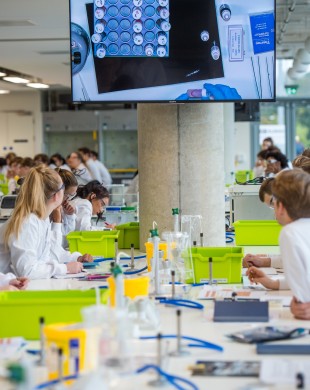



Charlotte A
Student - Nutrition BSc (Hons)


Sofia Wade
Student - Nutrition BSc (Hons)
Learn more about the qualifications we typically accept to study this course at Surrey.
Typical offer
- BSc (Hons):
- ABB-BBB
- Required subjects: Biology and one from the following - Chemistry, Physics, Sport Studies, Physical Education, Mathematics, Statistics, Psychology, Geography, Environmental Science, Food Technology, Home Economics, or Nutrition and Food Science.
- BSc (Hons) with foundation year:
- CCC
- Required subjects: a science subject.
A-level General Studies and A-level Critical Thinking are not accepted.
GCSE or equivalent: English Language and Mathematics at grade 4 (C).
- BSc (Hons):
- DDD-DDM in Applied Science.
- BSc (Hons) with foundation year:
- MMM in Applied Science.
Please contact the Admissions team if you are taking other BTECs in a similar subject area.
GCSE or equivalent: English language and mathematics at grade 4 (C).
- BSc (Hons):
- 33-32
- Required subjects: Biology or Chemistry HL5/SL6 and a second science or mathematics subject HL5/SL6.
- BSc (Hons) with foundation year:
- 29
- Required subjects: a science subject HL4/SL6.
GCSE or equivalent: English A HL4/SL4 or English B HL5/SL6 and Mathematics (either course) HL4/SL4.
- BSc (Hons):
- 78-75%
- Required subjects: Biology or Chemistry 7.5 and a second science subject or Mathematics (5 period) 7.5.
- BSc (Hons) with foundation year:
- For foundation year equivalencies please contact the Admissions team.
GCSE or equivalent: English Language (1/2) 6 or English Language 3 (7) and Mathematics 6.
- BSc (Hons):
- QAA-recognised Access to Higher Education Diploma with 45 Level 3 credits overall including 30 at Distinction and 15 at Merit - 27 at Distinction and 18 at Merit.
- Required subjects: 15 credits in Biology or Chemistry and 15 credits in another science subject.
- BSc (Hons) with foundation year:
- QAA-recognised Access to Higher Education Diploma with 45 Level 3 credits overall including 21 at Distinction, 3 at Merit and 21 at Pass.
- Required subjects: modules must be in relevant subjects.
GCSE or equivalent: English Language and Mathematics at grade 4 (C).
- BSc (Hons):
- AABBB-ABBBB
- Required subjects: Biology or Chemistry and another science or mathematics subject.
- BSc (Hons) with foundation year:
- BBBCC
- Required subjects: a science subject.
GCSE or equivalent: English Language and Mathematics at grade C (Scottish National 5).
- BSc (Hons):
- ABB-BBB from a combination of the Advanced Skills Baccalaureate Wales and two A-levels.
- Required subjects: A-level Biology and an A-level in another science or mathematics subject.
- BSc (Hons) with foundation year:
- CCC from a combination of the Advanced Skills Baccalaureate Wales and two A-levels.
- Required subjects: an A-level in a science subject.
A-level General Studies and A-level Critical Thinking are not accepted.
GCSE or equivalent: English Language and Mathematics at grade 4 (C).
- BSc (Hons):
- Distinction overall, with minimum C in the Core Component.
- Required subjects: Science.
- BSc (Hons) with foundation year:
- Pass overall, with minimum D in the Core Component.
- Required subjects: Science.
GCSE or equivalent: English Language and Mathematics at grade 4 (C).
Applicants taking the Extended Project Qualification (EPQ) will receive our standard A-level offer for this programme, plus an alternate offer of one A-level grade lower, subject to achieving an A grade in the EPQ. The one grade reduction will not apply to any required subjects.
Applicants can only receive one grade reduction from the published grades, an EPQ grade reduction can’t be applied in addition to other grade reductions made through other schemes such as Contextual Admissions or In2Surrey.
English language requirements
IELTS Academic: 6.5 overall with at least 6.0 in each component.
View the other English language qualifications that we accept.
If you do not currently meet the level required for your programme, we offer intensive pre-sessional English language courses, designed to take you to the level of English ability and skill required for your studies here.


International Foundation Year
If you are an international student and you don’t meet the entry requirements for this degree, we offer the International Foundation Year at the Surrey International Study Centre. Upon successful completion, you can progress to this degree course.
Selection process
We normally make offers in terms of grades.
If you are a suitable candidate you will be invited to an offer holder event. During your visit to the University you can find out more about the course and meet staff and students.
Recognition of prior learning
View our Code of practice for Recognition of Prior Credit and Prior Learning and further guidance: Credit Transfer and Recognition of Prior Learning - Guide for Applicants (PDF) for more information.
We recognise that many students enter their higher education course with valuable knowledge and skills developed through a range of professional, vocational and community contexts.
If this applies to you, the recognition of prior learning (RPL) process may allow you to join a course without the formal entry requirements or enter your course at a point appropriate to your previous learning and experience. There are restrictions on RPL for some courses and fees may be payable for certain claims.
Contextual offers
Did you know eligible students receive support through their application to Surrey, which could include a grade reduction on offer?
Fees
Explore UKCISA’s website for more information if you are unsure whether you are a UK or overseas student. View the list of fees for all undergraduate courses.
Payment schedule
- Students with Tuition Fee Loan: the Student Loans Company pay fees in line with their schedule.
- Students without a Tuition Fee Loan: pay their fees either in full at the beginning of the programme or in two instalments as follows:
- 50% payable 10 days after the invoice date (expected to be during October to November of each academic year).
- 50% in January of the same academic year.
- The exact date(s) will be on invoices. Students on part-time programmes where fees are paid on a modular basis cannot pay fees by instalment.
- Sponsored students: must provide us with valid sponsorship information that covers the period of study.
Professional training placement fees
Professional Training placement year fees are approximately 20% of the full-time fee for the academic year in which you undertake your placement.
Additional costs
Safety equipment and/or uniform: £24 – equipment pack (includes laboratory coat, laboratory glasses, laboratory books, pen and bag). You are responsible for the costs associated with maintaining/washing/replacing any equipment.
These additional costs are accurate as of September 2025 and apply to the 2026 year of entry. Costs for 2027 entry will be published in September 2026.
Scholarships and bursaries
Discover what scholarships and bursaries are available to support your studies.
Our award-winning Professional Training placement scheme gives you the chance to spend a year in industry, either in the UK or abroad.
We have thousands of placement providers to choose from, most of which offer pay. So, become one of our many students who have had their lives and career choices transformed.
Statistics
Placement Statistics
92%
of students who did a placement entered into graduate level employment*
80%
of placements are paid, with 60% paying between £18,000 - £30,000
48%
of our students have been offered a graduate role from their placement provider**
*Graduate Outcomes 2025, HESA
**Professional training year returners survey 2024
Nutrition placements
We offer a wide range of placements with companies in the UK and worldwide.
Previous students have gained placements with:
- Nutricia
- Pladis
- Sainsbury's
- Tata Global Beverages
- Unilever
- Yakult.
We also have an extensive number of partner institutions that offer placements exclusively to Surrey students, giving you access to research laboratories across the world. Explore your options via our search tool and find out more about our current partner universities and organisations.
Applying for placements
Students are generally not placed by the University. But we offer support and guidance throughout the process, with access to a vacancy site of placement opportunities.
Find out more about the application process.
Study and work abroad
Studying at Surrey opens a world of opportunity. Take advantage of our study and work abroad partnerships, explore the world, and expand your skills for the graduate job market.
The opportunities abroad vary depending on the course, but options include study exchanges, work/research placements, summer programmes, and recent graduate internships. Financial support is available through various grants and bursaries, as well as Student Finance.
Perhaps you would like to volunteer in India or learn about Brazilian business and culture in São Paulo during your summer holidays? With 140+ opportunities in 36+ different countries worldwide, there is something for everyone. Explore your options via our search tool and find out more about our current partner universities and organisations.
Apply for your chosen course online through UCAS, with the following course and institution codes.
About the University of Surrey
Need more information?
Contact our Admissions team or talk to a current University of Surrey student online.
- BSc (Hons)View UCA10F0001U
- BSc (Hons) with placementView UCA10S0001U
- BSc (Hons) with foundation yearView UCA10F0002U
- BSc (Hons) with foundation year and placementView UCA10S0004U
Terms and conditions
When you accept an offer to study at the University of Surrey, you are agreeing to follow our policies and procedures, student regulations, and terms and conditions.
We provide these terms and conditions at offer stage and are shown again at registration. You will be asked to accept these terms and conditions when you accept the offer made to you.
Disclaimer
This online prospectus has been published in advance of the academic year to which it applies.
Whilst we have done everything possible to ensure this information is accurate, some changes may happen between publishing and the start of the course.
It is important to check this website for any updates before you apply for a course with us. Read our full disclaimer.
